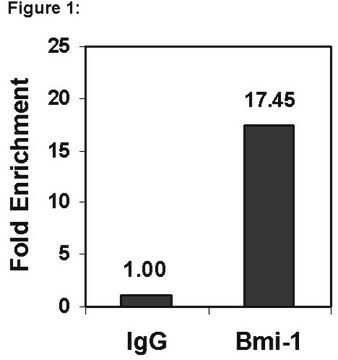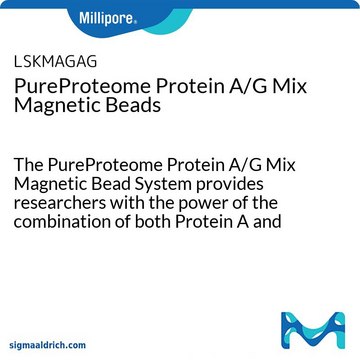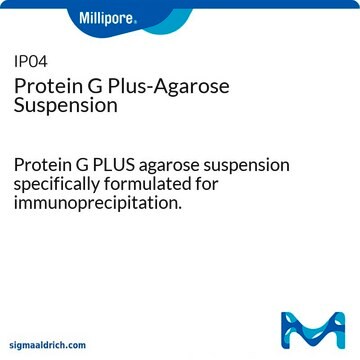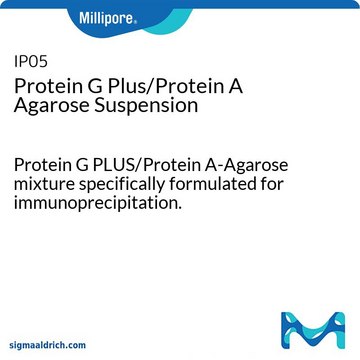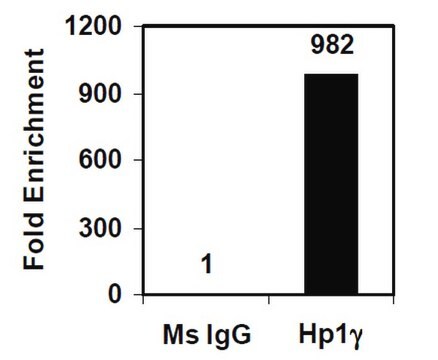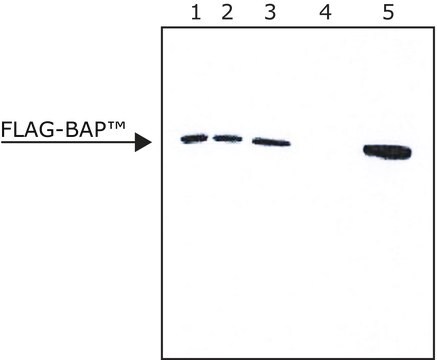11719386001
Roche
Immunoprecipitation Kit (Protein G)
sufficient for 20 reactions, kit of 1, suitable for immunoprecipitation (IP)
Sinonimo/i:
Protein G, immunoprecipitation kit
Autenticatiper visualizzare i prezzi riservati alla tua organizzazione & contrattuali
About This Item
Codice UNSPSC:
12352200
Prodotti consigliati
impiego
sufficient for 20 reactions
Confezionamento
kit of 1
Produttore/marchio commerciale
Roche
tecniche
immunoprecipitation (IP): suitable
Condizioni di spedizione
wet ice
Temperatura di conservazione
2-8°C
Descrizione generale
Kit contains all reagents necessary for cell lysis, solubilization, stabilization, and immunopurification of proteins.
Specificità
Protein G is a cell wall protein, isolated from a specific bacterial strain, which has specific binding sites for certain classes of immunoglobulins from different species. Protein G binds nearly all subclasses of IgG, but no other classes of immunoglobulins.
Applicazioni
The immunoprecipitation kit has been used for the immunoprecipitation of proteins from cellular extracts with Protein G Agarose.
Confezionamento
1 kit containing 5 components.
Nota sulla preparazione
Working solution: Lysis buffer/wash buffer 1
The kit contains reagents for 125 ml of lysis buffer/wash buffer 1. Prepare at least a minimal volume of 25 ml, sufficient for four immunoprecipitations.
To prepare 25 ml of lysis buffer/wash buffer 1 mix 5 ml core buffer, 3.75 ml NaCl, 2.5 ml detergent mix and 1 cOmplete Tablet. Add water to a final volume of 25 ml.
Solution is stable at 2 to 8 °C for 24 hours. When stored in aliquots at -15 to -25 °C, the solution is stable for at least four weeks. Mix thoroughly after thawing.
Wash buffer 2
The kit contains reagents for 50 ml of wash buffer 2. 2 ml of this buffer is required for one immunoprecipitation.
To prepare 50 ml of wash buffer 2 mix 10 ml core buffer, 25 ml NaCl and 0.5 ml detergent mix. Add water to a final volume of 50 ml.
Solution is stable at 2 to 8 °C. For longer periods, store aliquots at -15 to -25 °C. Mix thoroughly after thawing.
Wash buffer 3
The kit contains reagents for 25 ml of wash buffer 3. 1 ml of this buffer is required for one immunoprecipitation.
To prepare 25 ml mix 1 ml core buffer and 0.25 ml detergent mix. Add water to a final volume of 25 ml.
Solution is stable at 2 to 8 °C. For longer periods, store aliquots at -15 to -25 °C. Mix thoroughly after thawing.
The kit contains reagents for 125 ml of lysis buffer/wash buffer 1. Prepare at least a minimal volume of 25 ml, sufficient for four immunoprecipitations.
To prepare 25 ml of lysis buffer/wash buffer 1 mix 5 ml core buffer, 3.75 ml NaCl, 2.5 ml detergent mix and 1 cOmplete Tablet. Add water to a final volume of 25 ml.
Solution is stable at 2 to 8 °C for 24 hours. When stored in aliquots at -15 to -25 °C, the solution is stable for at least four weeks. Mix thoroughly after thawing.
Wash buffer 2
The kit contains reagents for 50 ml of wash buffer 2. 2 ml of this buffer is required for one immunoprecipitation.
To prepare 50 ml of wash buffer 2 mix 10 ml core buffer, 25 ml NaCl and 0.5 ml detergent mix. Add water to a final volume of 50 ml.
Solution is stable at 2 to 8 °C. For longer periods, store aliquots at -15 to -25 °C. Mix thoroughly after thawing.
Wash buffer 3
The kit contains reagents for 25 ml of wash buffer 3. 1 ml of this buffer is required for one immunoprecipitation.
To prepare 25 ml mix 1 ml core buffer and 0.25 ml detergent mix. Add water to a final volume of 25 ml.
Solution is stable at 2 to 8 °C. For longer periods, store aliquots at -15 to -25 °C. Mix thoroughly after thawing.
Altre note
For life science research only. Not for use in diagnostic procedures.
Solo come componenti del kit
N° Catalogo
Descrizione
- Core Buffer
- NaCl
- Detergent Mix
- cOmplete Protease Inhibitor Cocktail Tablets (5)
- Protein G Agarose ready-to-use
Avvertenze
Danger
Indicazioni di pericolo
Classi di pericolo
Aquatic Chronic 2 - Eye Dam. 1 - Skin Corr. 1B - Skin Sens. 1
Codice della classe di stoccaggio
8B - Non-combustible corrosive hazardous materials
Classe di pericolosità dell'acqua (WGK)
WGK 3
Punto d’infiammabilità (°F)
does not flash
Punto d’infiammabilità (°C)
does not flash
Scegli una delle versioni più recenti:
Possiedi già questo prodotto?
I documenti relativi ai prodotti acquistati recentemente sono disponibili nell’Archivio dei documenti.
I clienti hanno visto anche
Junping Ren et al.
PloS one, 9(3), e91865-e91865 (2014-03-13)
Human metapneumovirus (hMPV) is a leading cause of lower respiratory infection in young children, the elderly and immunocompromised patients. Repeated hMPV infections occur throughout life. However, immune evasion mechanisms of hMPV infection are largely unknown. Recently, our group has demonstrated
Xiaoying Ying et al.
Hypertension (Dallas, Tex. : 1979), 68(5), 1160-1170 (2016-08-31)
Ubiquitin-specific protease 18 (USP18), a USP family member, is involved in antiviral activity and cancer inhibition. Although USP18 is expressed in heart, the role of USP18 in the heart and in cardiac diseases remains unknown. Here, we show that USP18
Eun-Jin Choi et al.
Frontiers in molecular biosciences, 7, 609732-609732 (2021-02-20)
Respiratory syncytial virus (RSV) is the most common cause of lower respiratory tract infection in young children. However, effective treatment against RSV is unavailable. tRNA-derived RNA fragments (tRFs) are a recently discovered family of non-coding RNAs. We made an early
Jianqiang Bao et al.
Molecular and cellular endocrinology, 327(1-2), 89-97 (2010-06-19)
Spermiogenesis represents the process through which haploid male germ cells differentiate from round spermatids into elongated spermatids and eventually the male gametes called spermatozoa. Haploid cell differentiation is unique to male germ cell development and many unique genes/proteins essential for
Yi Liu et al.
Cardiovascular research, 101(1), 87-96 (2013-11-29)
Toll-interacting protein (Tollip) is a critical regulator of the Toll-like receptor-mediated signalling pathway. However, the role of Tollip in chronic pressure overload-induced cardiac hypertrophy remains unclear. This study aimed to determine the functional significance of Tollip in the regulation of
Protocolli
Immunoprecipitation Kit (Protein G) Protocol & Troubleshooting
Il team dei nostri ricercatori vanta grande esperienza in tutte le aree della ricerca quali Life Science, scienza dei materiali, sintesi chimica, cromatografia, discipline analitiche, ecc..
Contatta l'Assistenza Tecnica.


